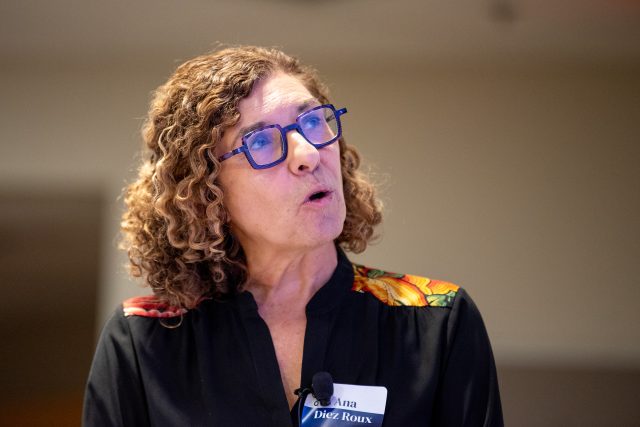[ad_1]
About 100 students and faculty gathered in the School of Public Health Thursday afternoon for the 42nd Thomas Francis Jr. Memorial Lecture, which celebrated the 25th anniversary of the University of Michigan Center for Social Epidemiology and Population Health. The lecture included a CSEPH poster session, an alumni panel and a keynote lecture by Dr. Ana Diez Roux, professor of epidemiology at Drexel University. During her lecture, Diez Roux spoke on social and environmental determinants of public health.
Dr. Belinda Needham, U-M associate professor and chair of epidemiology, opened the event by introducing Dr. Thomas Francis Jr.’s contributions to the field, including establishing the U-M epidemiology department in 1941.
“He mentored many students and junior faculty colleagues, including Jonas Salk, who went on to develop the Salk polio vaccine,” Needham said. “Beginning in 1954, Dr. Francis led an unprecedented field trial of the new polio vaccine, which included 1.8 million children.”
Epidemiology Professor Briana Mezuk then discussed the significance of the anniversary of CSEPH and the work its faculty and students have done to further social epidemiology research. She praised CSEPH’s training programs, including their social epidemiology certificate programs.
“Collectively, these efforts ensure that CSEPH will continue to shape the field of population health, both through the work of our own faculty and the future work of our fellows and students,” Mezuk said.
Diez Roux began her lecture by expressing her gratitude for being back at the University. She previously served as director of the Robert Wood Johnson Health and Society Scholars Program, director of CSEPH and chair of the Epidemiology Department before leaving for Drexel University in 2014.
Diez Roux then spoke on some of the studies she did while at CSEPH, including using multilevel analysis of multiple epidemiologic studies to link the geography of neighborhoods with the potential risk of cardiovascular disease.
“We started to get very interested in recognizing that neighborhoods or places need to be thought of as an integral part of the complex systems that give rise to population health,” Diez Roux said. “And of course, macro factors like racism and equality shape personal resources (and) impact discrimination, which modulates the extent to which people can use their resources to live in different areas.”
She continued by discussing a study done on how proximity to supermarkets can impact people’s diets and further health inequities.
“The first was that (spatial) segregation on its own, the segregation of food stores and people, could create disparities in diet even in the presence of no differences in preferences or price,” Diez Roux said. “Changing preferences was not enough to overcome these disparities, and price manipulation seemed to have a stronger impact than preference manipulation, although they reinforced each other.”
Diez Roux also talked about starting her career at Drexel University and her desire to research urban health in Latin America. This led to the creation of The Salud Urbana en América Latina Project, a study Diez Roux led about urban health in Latin America. Its aim was to improve health in Latin American cities in ways that account for equity and environmental sustainability.
“The goal is to draw lessons from Latin America, and to have (a) regionally engaged collaborative platform for science, but also for impact and inclusion,” Diez Roux said. “Our conclusion was that fair policies are needed to reduce time poverty among low (socioeconomic status) people, because in Latin America, a lot of people walk, but they walk long distances because they have no other choice.”
Diez Roux further discussed the importance of dynamic analysis in understanding complex public health issues.
“We can’t understand these problems or solve these problems with a single method or with a single study,” Diez Roux said. “It’s about the cumulative understanding which causes us to change the paradigms that we live under, and opens us up for new actions that we hadn’t thought possible.”
Medical student Abigail Kappelman discussed in an interview with The Michigan Daily the impact of CSEPH on her career and what she could learn from Diez Roux.
“I think CSEPH was a big reason why I was interested in doing my Ph.D. here at Michigan, because of the history of really influential work and social epidemiology that’s been done here,” Kappelman said. “I think hearing Dr. Diez Roux, who’s been a mentor to so many of my mentors, talk about the overarching nature of her career was really cool.”
Daily Staff Reporter Paige Stallman can be reached at pstall@umich.edu.
Related articles
[ad_2]
Source link











